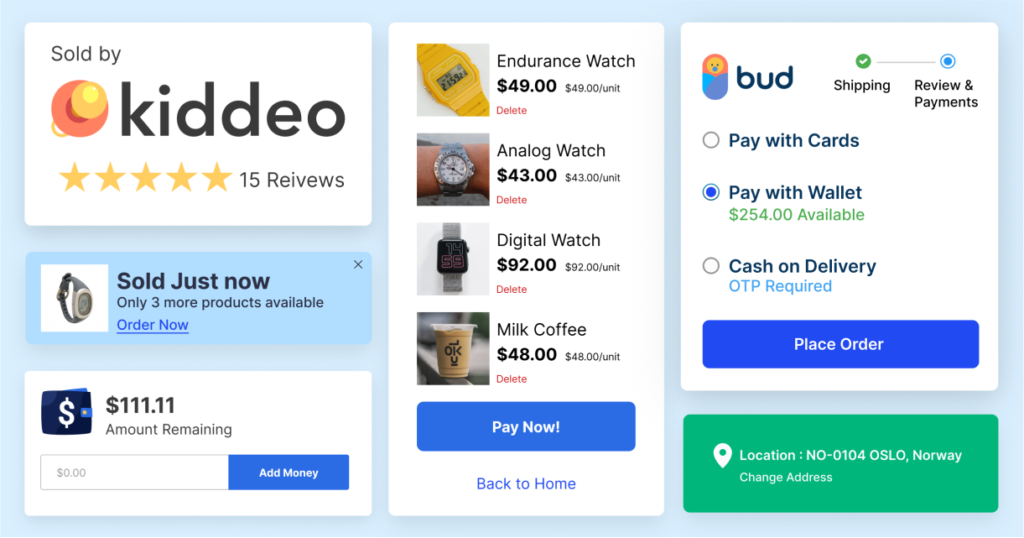API Development
Smartron Solutions has been dedicated to API development for over 13 years. Our focus is on creating eCommerce plugins that take customer convenience to the next level. With our extensive experience, we ensure seamless integration and enhanced functionality to improve the user experience and drive business growth.
Microservices Architecture
Microservices are individual, self-contained services with loose coupling, each dedicated to a specific business logic task.
When constructing an eCommerce system with a microservices architecture, it's entirely feasible to employ multiple server-side technologies. For instance, you might utilize PHP for API generation, Node.js for notifications and order creation, and Elastic for search functionality. Unlike monolithic systems, where the entire codebase and technology stack are uniform across all business services, microservices offer the flexibility to diversify your tech stack as needed. This approach allows for greater scalability, easier maintenance, and the ability to leverage the best tools for each specific task.

Modern API development relies on two key protocols:
SOAP (Simple Object Access Protocol) and REST (Representational State Transfer) are two popular API protocols.
REST-based APIs have gained significant popularity in recent times. They are supported by HTTP standards, allowing data retrieval and management via URLs and returning data in JSON format, which is easily renderable on various interfaces, be it web or mobile.
At Smartron Solutions , we employ REST-based APIs for all our native mobile applications and headless development. Moreover, REST APIs are not limited to web and eCommerce development; they are also utilized in Product Information Management (PIM) development.
Additionally, GraphQL, an emerging API query language, has been gaining rapid popularity. GraphQL is particularly beneficial for large-scale applications and plays a significant role in headless development. Its flexibility and efficiency make it a preferred choice for modern API development.
Payment Gateways
Incorporate a payment gateway extension to accept payments from customers.
Shipping Methods
Utilize shipping integration extensions to efficiently handle customer orders.
SMS Gateway
Utilize an SMS gateway module for sending notifications to customers via text messages on their mobile numbers.
Logistics API
Provide a range of services, ensuring timely delivery of goods as promised to customers.
Multi-channel Integration
Connect multiple eCommerce or marketplace channels through a unified online platform.
Services Integration
Integrate various services, including Google Maps and more.
API Development
APIs (Application Programming Interfaces) serve as the cornerstone of contemporary infrastructure, whether on the web, mobile, ERP, or CRM systems. Indeed, they play an immensely significant role in modern technology. APIs enable seamless communication between different software systems, facilitating enhanced functionality and user experience.
API Infrastructure
The role of APIs is expanding with each passing day, particularly as modern web infrastructure trends towards headless and microservices architecture. APIs enable seamless communication between different components, enhancing flexibility and scalability in the development process. This makes them indispensable in the current technological landscape.


Headless Architecture
Headless development is steadily gaining popularity. In this approach, front-end development relies on a template engine or JavaScript frameworks such as Vue.js, ReactJS, and AngularJS.
Moreover, headless systems are advantageous for creating Progressive Web Apps (PWAs) and multichannel applications. For instance, if you have a PWA Magento website and mobile apps, the same API can be leveraged for both web frontend and native mobile app development. This unified approach ensures consistency and efficiency across different platforms.

Role of API
The role of APIs is pivotal, and in the modern technology landscape, no stack is complete without them. Numerous instances of APIs can be found in everyday life, such as:
- Weather Data: Applications that provide weather updates use APIs to fetch data from weather services.
- Social Media Integration: Websites and apps use APIs to connect with social media platforms like Facebook, Twitter, and Instagram.
- Payment Gateways: Online stores use APIs to integrate with payment processors like PayPal, Stripe, and Square.
- Mapping Services: Apps like Uber and Google Maps use APIs to access location and mapping data.
- E-commerce Platforms: Marketplaces like Amazon and eBay offer APIs to allow sellers to manage their inventory and orders apdevelopmentllc.
APIs enable seamless communication between different software systems, enhancing functionality and user experience.
You're in excellent company as we are highly certified developers at the forefront of our field.
Smartron Solutions is renowned for its extensive and satisfied customer clientele. Our commitment to delivering high-quality solutions has earned us a reputation for excellence and customer satisfaction Smartron Solutions
